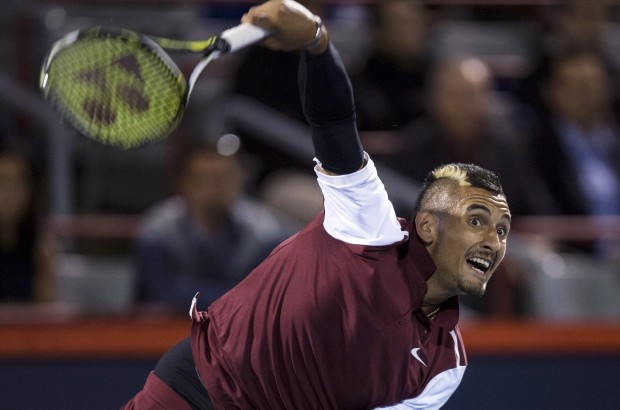
Nick Kyrgios of Australia serves to Stan Wawrinka of Switzerland during second round of play at the Rogers Cup tennis tournament Wednesday August 12, 2015 in Montreal. THE CANADIAN PRESS/Paul Chiasson at the Rogers Cup tennis tournament Wednesday, Aug. 12, 2015, in Montreal. (Paul Chiasson/The Canadian Press via AP)
BRISBANE, Australia — With tournament titles drying up, it’s the tantrums now that are drawing attention to Australian men’s tennis.
A month after Nick Kyrgios faced criticism from some of Australia’s sporting greats for his racket-smashing, profanity-laced run at Wimbledon, the 20-year-old Aussie was back at the center of another media storm following his unsavory remarks to two-time major champion Stan Wawrinka during a Rogers Cup match in Montreal on Wednesday.
Wawrinka urged tennis authorities on Thursday to take action against Kyrgios for comments that were “not only unacceptable but also beyond belief.”
A courtside microphone picked up Kyrgios saying that Australian player Thanasi Kokkinakis had slept with a player who is reportedly Wawrinka’s girlfriend.
“There is no need for this kind of behavior on or off the court and I hope the governing body of this sport does not stand for this,” the fifth-ranked Wawrinka posted on Twitter.
Kyrgios, who advanced when Wawrinka retired in the third set with a lower-back injury, later claimed there was an element of provocation.
“He was getting a bit lippy at me so, I don’t know, it’s just in-the-moment sort of stuff,” Kyrgios said in a post-match interview. “I don’t really know, I just said it.”
At Wimbledon, Kyrgios battled with umpires time and again, was accused of tanking and swore so loudly and abused his rackets so violently that he was fined nearly $10,000. He lost in the fourth round to Richard Gasquet.
Australian swimming great Dawn Fraser said she was disgusted with Kyrgios’ behavior at Wimbledon, telling a breakfast television show that he “should be setting a better example for the younger generation of this great country of ours.”
Her later remark — “If they don’t like it, go back to where their fathers or their parents came from” — caused an instant storm on social media, with the 77-year-old Fraser later apologizing for the comments. Kyrgios was born in Canberra, the Australian capital. His father was born in Greece and his mother in Malaysia.
Rod Laver, who completed the Grand Slam twice in the 1960s, said Kyrgios’ behavior was holding back his development as a player.
“Nick’s young and maybe doesn’t realize what he is doing sometimes,” Laver said. “He’s playing with emotion … that’s certainly something that he needs to grow out of and he needs to grow out of that sooner rather than later. There’s certainly no excuse for swearing. That’s just bad behavior, that’s ugly.”
Obviously, Kyrgios didn’t take heed of the advice very quickly. Now, he’s overshadowing fellow Australian Bernard Tomic in the headlines.
The pair had their troubles at Wimbledon, when the 22-year-old Tomic renewed his ongoing messy tussle with Pat Rafter, who now is Tennis Australia’s performance director.
Tomic used a post-match Wimbledon news conference to respond to Rafter’s comments that were critical of him, and was suspended from Australia’s home Davis Cup quarterfinal series against Kazakhstan in Darwin last month.
So when he could have been playing Davis Cup, he was arrested and charged with resisting arrest and trespassing in Miami Beach, Florida.
Tomic reportedly ignored repeated warnings over loud music after noise complaints from other guests at a Miami Beach hotel, and a Miami police report stated that he “pointed his finger aggressively toward the hotel security officers and continued to play loud music.”
Rafter told Australian media after the Miami incident that he felt Tomic had hit “rock bottom.” It was not Tomic’s first issues with police.
In 2013, he had his driver’s license taken away after he was caught speeding on the Gold Coast near Brisbane, Australia. A year earlier, he was placed under police investigation after an alleged brawl in a Gold Coast apartment spa.
Tomic’s father and coach, John Tomic, was given an eight-month suspended sentence and banned from the ATP Tour for a year in September 2013 for assaulting his son’s former hitting partner, Thomas Drouet.
Lleyton Hewitt, who matured after having his own run-ins with officialdom and fans, was the last Australian man to win a men’s major when he beat David Nalbandian in the 2002 Wimbledon final.